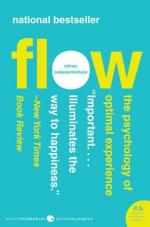
|
| Name: _________________________ | Period: ___________________ |
This test consists of 15 multiple choice questions and 5 short answer questions.
Multiple Choice Questions
1. Consciousness will always allow random thoughts and events to creep in, even if one is currently ______________.
(a) Asleep.
(b) Dead.
(c) Engaged in another task.
(d) Praying.
2. Any action which requires attention from a person will results in the removal of the ability to fully __________ on other things.
(a) Post judgment.
(b) Touch.
(c) Enjoy.
(d) Focus.
3. How many strategies does the author provide for improving the quality of life?
(a) Three.
(b) One.
(c) Ten.
(d) Two.
4. Pleasure is the realization of ___________, while enjoyment is the situation when goals are exceeded, according to the author.
(a) Truth.
(b) Honor.
(c) Ecstasy.
(d) Goals met.
5. Many believe that the excitement of the challenge comes from _____________ of a particular situation.
(a) Being in control.
(b) The challenge.
(c) The goals.
(d) The audience.
6. A man who ________ may put himself into hot water and alienate a boss, causing him to have a lesser chance of getting a promotion.
(a) Cries.
(b) Laughs.
(c) Rages.
(d) Smiles.
7. To have happiness, to find _________, one must realize that changing one's reactions is simpler and more effective.
(a) Success.
(b) Money.
(c) Flow.
(d) Truth.
8. For many reasons, the idea of psychic entropy is the direct opposite of optimal __________, according to the author.
(a) Living.
(b) Experience.
(c) Truth.
(d) Honor.
9. An event that conflicts with the self can wreak havoc until the ________ accepts or rejects appropriate behaviors and attitudes.
(a) Inner child.
(b) Worker.
(c) Self.
(d) Boss.
10. In the author's research, ___________ was perceived the same way by all involved, regardless of age, ethnicity or social/economic rank.
(a) Hunger.
(b) Energy.
(c) Flow.
(d) Disease.
11. It is safe to say, according to the author, that _________ has been used to enrich virtually every facet of human existence.
(a) Truth.
(b) Flow.
(c) Literature.
(d) Therapy.
12. The author believes it is nearly impossible to put a ___________ on the culture's effect on its people.
(a) Value.
(b) Price tag.
(c) Label.
(d) Summary.
13. Some philosophies state that outside forces that affect us are largely outside of us, which causes our lives to be ____________ and out of our control.
(a) Energetic.
(b) Pre-ordained.
(c) Boring.
(d) Mutable.
14. The author points out that there are events in one's life which may escape a person's _________________.
(a) Truth.
(b) Bank account.
(c) Consciousness.
(d) Eyesight.
15. The author believes that the final analysis of the _________ order of the consciousness is incomplete and that it requires further study.
(a) Active.
(b) Energetic.
(c) Linear.
(d) Cloud.
Short Answer Questions
1. The author believes that flow may have a ___________ component, coming from the parents to the children.
2. The author believes that without _____________, one can not measure success and thus enjoyment will not be complete.
3. What is NOT one of the ways in which a person might find happiness, according to the author of the book?
4. The author believes it is easy to differentiate between ____________ and enjoyment, though the two are closely related.
5. What is the name that the author has coined for people who are internally driven to find flow in their lives?
|
This section contains 465 words (approx. 2 pages at 300 words per page) |

|




